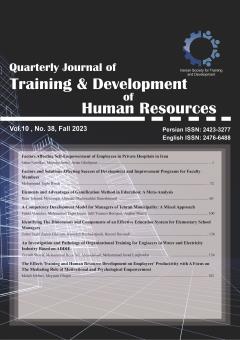Factors Affecting Self-Empowerment of Employees in Private Hospitals in Iran
Subject Areas :
sahar nazifkar
1
*
,
mojtaba amiri
2
,
Arian Gholipour
3
![]()
1 - PhD in organizational behavior management and human resources
2 - Associate Professor, Faculty of Management, University of Tehran
3 - Professor at Tehran University's Faculty of Management
Keywords: self-empowerment, empowerment, causal factors, human resources, hospital.,
Abstract :
The purpose of this study was to identify the factors which affect the self-empowerment of employees in private hospitals in Iran and it was conducted by combining qualitative (data base) and quantitative (survey) methods. The statistical population were selected for both qualitative and quantitative parts. In the qualitative phase 40 individuals were selected. From this sample, 20 individuals were managers and employees of private hospitals and 20 individuals were university professors and experts in the field of management. The data in this part was collected through interviews which continued until theoretical saturation was reached. In the quantitative phase, using Cochran's formula, 293 individuals were selected randomly. The data collected from the interviews were analyzed through the grounded theory and the data from the questionnaire were analyzed using SPSS statistical software. The findings revealed that self-empowerment could be considered as a psychological phenomenon based on individual activism. This refers to a process where a set of causal factors (individual and organizational factors or, in other words, internal and external factors), contextual factors (including cultural-social and organizational factors), intervening organizational factors (including organizational justice and organizational transformation and modernization) involve in its formation. Among the mentioned factors, the respondents offered a better evaluation of individual factors compared to organizational factors regarding the casual factors, of organizational nature compared to cultural and social factors in terms of the contextual factors, and of organization change and update compared to organizational justice in terms of intervening factors.
- صمدی میارکلائی، حسین و صمدی میارکلائی، حمزه (1399)، توانمندسازی روانشناختی ابزاری جهت کنترل پرسه زنی اینترنتی، فصلنامه فنآوری اطلاعات و ارتباطات در علوم تربیتی، سال دهم، شماره 3: 160- 145.
- رضایی، بهرام، نریمانی، علیرضا و رجب پور، مجید (1393)، طراحی الگوی توانمندسازی سرمایه های انسانی در نیروهای نظامی جمهوری اسلامی ایران، فصلنامه راهبرد دفاعی، سال دوازدهم، شماره 48.
- سلاجقه، سنجر؛ نیک پور، امین و زارع کاسب، معصومه (1391)، نقش توانمندسازی کارکنان در اثر بخشی و کارایی سازمان، ماهنامه کار و جامعه، شماره 147.
- عباسپور، عباس؛ بدری، مرتضی. (1394). رابطه بین توانمندسازی روانشناختی و عوامل موثر بر بهرهوری منابع انسانی، مطالعات مدیریت (بهبود و تحول)، 24(79).
- فیروز فر، فهیمه؛ زم، فاطمه؛ منصوری، الهام و ولی زیبایی، خدیجه (1396)، پیش درآمدی بر ادبیات مفهومی توانمندسازی روانی اجتماعی، رویش روان شناسی، سال ششم، شماره 2.
1. Catherine C., Tom B., Alan W. (2011), "Relocating empowerment as a management concept for Asia; Journal of Business Research, In Press, Corrected Proof, Available Online 6.
2. Conger, jay.A & kanungorobindra N.(1988), The empowerment process: integrating theory and practice, Academy of management review, V13, N3.
3. Hagen, M., & Gavrilova Aguilar, M. (2012). The impact of managerial coaching on learning outcomes within the team context: An analysis. Human Resource Development Quarterly, 23(3).
4. Han, Shenghao; Liu, Dewen and Lv, Yiliang (2022), The Influence of Psychological Safety on Students’ Creativity in Project-Based Learning: The Mediating Role of Psychological Empowerment, ORIGINAL RESEARCH article, Front. Psychol., 27 April 2022, Sec. Educational Psychology https://doi.org/10.3389/fpsyg.2022.865123
5. Kumari, S. (2020). A Study on Psychological Empowerment of Women Artist Involved in Mithila Painting. The Pharma Innovation Journal, 9(3).
6. Prabowo, R., Mustika, D., & Sjabadhyni, B. (2018). How a Leader Transforms Employees’ Psychological Empowerment into Innovative Work Behavior. Psychological Research on Urban Society, 1(2).
7. Monica, R., & Krishnaveni, R. (2019). Enhancing innovative work behavior through work engagement: Examining the role of psychological empowerment and social support. International Journal of Business Innovation and Research, 20(4), 527.https://doi.org/10.1504/ijbir.2019.103323.
8. Shihab Ahmed , Ibrahim Suleiman Masri, Manal Majed Abu Minshar & Alhamzah F. Abbas (2022), The Mediation Role of Psychological Empowerment on the Relationship Between Dialogical Leadership and Organizational Brilliance, Employee Responsibilities and Rights Journal .
9. Thomas, K & Velthouse, B. (1990),Cognitive Elements of Empowerment, an Interpretive Model of Intrinsic task motivation, academt of management review, No.15.

